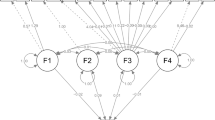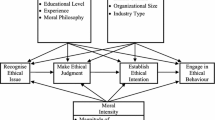Abstract
Forsyth’s (1980) Ethics Position Questionnaire and Hunt et al.’s (1989) Corporate Ethical Value Questionnaire are used to examine the ethical ideologies of senior managers from organizations listed in the Australian Stock Exchange. The results indicate how corporate ethical values, religion, gender, and age are related to the idealism and relativism of senior Australian managers. After discussing the results, limitations of the study are offered. Finally, managerial implications are provided and recommendations for future research are given.
Similar content being viewed by others
References
Abramson M. 1985 The Autonomy-Paternalism Dilemma in Social Work Practice. Social Casework 66:387–393
Arslan M. 2001 The Work Ethic Values of Protestant British, Catholic Irish and Muslim Turkish Managers. Journal of Business Ethics 31:321–340
Australian Bureau of Statistics: 2007, Religious Affiliation by Age-Time Series Statistics (1996, 2001, 2006 Census Years), Available Online http://www.censusdata. abs.gov.au, Accessed on 31 July 2007
Eagly A., Wood W. 1991 Explaining Sex Differences in Social Behavior: A Meta-Analytic Perspective. Personality and Social Psychology Bulletin 17:306–321
Fernando, M.: 2007, ‹Corporate Social Responsibility in the Wake of the Asian Tsunami: A Comparative Case Study of Two Sri Lankan Companies’, European Management Journal, 25(1), 1–10
Ferrell O. C., Gresham L. G. 1985 A Contingency Framework for Understanding Ethical Decision Making in Marketing. Journal of Marketing 49:87–96
Forsyth D. R. 1992 Judging the Morality of Business Practices: The Influence of Personal Moral Philosophies. Journal of Business Ethics 11:461–470
Forsyth D. R., Nye J. L., Kelley K. 1988 Idealism, Relativism, and the Ethic of Caring. Journal of Psychology 122:243–248
Forsyth D. R. 1980 A Taxonomy of Ethical Ideologies. Journal of Personality and Social Psychology 39(1):175–184
Franke G. R., Crown D. F., Spake D. F. 1997 Gender Differences in Ethical Perceptions of Business Practices. Journal of Applied Psychology 82:920–934
Gilligan C. 1982 In a Different Voice: Psychological Theory and Women’s Development. Harvard University Press, Cambridge, MA
Hall E. T. 1976 Beyond Culture. Anchor Books, Doubleday, Garden City, NY
Henle C., Giacalone R., Jurkiewicz C. 2005 The Role of Ethical Ideology in Workplace Deviance. Journal of Business Ethics 56:219–230
Hunt S. D., Vitell S. 1993 The General Theory of Marketing Ethics: A Retrospective and Revision. in N. C. Smith, J. A. Quelch (eds), Ethics in Marketing. Irwin, Homewood, IL
Hunt S. D., Vitell S. 1986 A General Theory of Marketing Ethics. Journal of Macromarketing 8:5–16
Hunt S. D., Wood V. R., Chonko L. B. 1989 Corporate Ethical Values and Organizational Commitment in Marketing. Journal of Marketing 53:79–90
Jansen E., Vin Glinow M. A. 1985 Ethical Ambience and Organizational Reward Systems. Academy of Management Review 10(4):814–822
Karande K., Rao C. P., Singhapakdi A. 2002 Moral Philosophies of Marketing Managers: A Comparison of American, Australian, and Malaysian Cultures. European Journal of Marketing 36(7/8):768–791
Kohlberg L. 1981 The Meaning and Measurement of Moral Development. Clark University Press, Worcester, MA
Kohlberg L. 1983, Moral Stages: A Current Formulation and a Response to Critics. Karger, New York
Laczniak G. R., Inderrieden E. J. 1987 The Influence of Stated Organizational Concern Upon Ethical Decision Making. Journal of Business Ethics 6(4):297–307
Ladd J. 1991 The Quest for a Code of Professional Ethics: An Intellectual and Moral Confusion. in Deborah Johnson (ed.), Ethical Issues in Engineering. Prentice Hall, New Jersey
Loewenberg, F. and R. Dolgoff: 1996, Ethical Decisions for Social Work Practice (F. E. Peacock, New York)
Longenecker J. G., Mckinney J. A., Moore C. W. 2004 Religious Intensity, Evangelical Christianity, and Business Ethics: An Empirical Study. Journal of Business Ethics 55:373–386
Reamer F. 1990 Ethical Dilemmas in Social Service. Columbia University Press, New York
Singhapakdi A., Salyachivin S., Virakul B., Veerayangkur V. 2000 Some Important Factors Underlying Ethical Decision-Making of Managers in Thailand. Journal of Business Ethics 27(3):271–285
Singhapakdi A., Kraft K. L., Vitell S. J., Rallapalli K. C. 1995 The Perceived Importance of Ethics and Social Responsibility on Organizational Effectiveness: A Survey of Marketers. Journal of Academy of Marketing Science 23(1):49–56
Singhapakdi A., Vitell S. J., Franke G. R. 1999 Antecedents, Consequences, and Mediating Effects of Perceived Moral Intensity and Personal Moral Philosophies. Journal of the Academy of Marketing Science 27(1):19–35
Sparks J. R., Hunt S. D. 1998 Marketing Researcher Ethical Sensitivity: Conceptualization, Measurement, and Exploratory Investigation. Journal of Marketing 62(2):92–109
Taylor, S. J.: 2003, How Do Hofstede’s Dimensions Correlate With The World’s Religions? The International Business Center Newsletter, April, Available Online, Http://www.Internationalbusinesscenter.Org/International_Newsletter/Volume2_Issue1.Htm , Accessed on January 8, 2006
Terpstra D. E., Rozell E. J., Robinson R. K. 1993 The Influence of Personality and Demographic Variables on Ethical Decisions Related to Insider Trading. The Journal of Psychology 127(4):375–389
Trevino L. K. 1986 Ethical Decision Making in Organizations: A Person-Situation Interactionist Model. Academy of Management Review 11(3):601–617
Vitell S. J., Singhapakdi A. 1993 Ethical Ideology and its Influence on the Norms and Judgments of Marketing Practitioners. Journal of Marketing Management 3:1–11
Weeks W. A., Nantell J. 1992 Corporate Codes of Ethics and Sales Force Behavior: A Case Study. Journal of Business Ethics 11(10):753–760
Acknowledgement
Research assistance provided by Renae Hellmund is gratefully acknowledged.
Author information
Authors and Affiliations
Corresponding author
Additional information
Mario Fernando (PhD, MBA, BCom) is a Senior Lecturer at␣the School of Management and Marketing, University of Wollongong, Australia, and a Visiting Research Fellow of the Centre for Studies in Religion and Society, University of␣Victoria, Canada. His current teaching and research focus is on organizational virtuousness, workplace spirituality, ethical and spiritual leadership. His most recent work is due to be published in a book titled Spiritual Leadership in the Entrepreneurial Business: A Multifaith Study (2007, Edward Elgar).
Shyamali C. Dharmage (PhD, MD, MSc, MBBS) is a Senior Lecturer at the Centre for MEGA (Molecular, Environmental, Genetic & Analytic) Epidemiology, School of Population Health, University of Melbourne, Australia. Her main research focus is on the epidemiology of allergy and airway diseases. In addition, she contributes to the methodological and analytical aspects of research projects in other areas.
Shamika Almeida (MSc, MBA) is a PhD candidate in the Work and Organisational Studies Discipline at the University of Sydney, Australia. Her research is on social and human capital issues.
Appendix
Appendix
Measurement Scales for Idealism, Relativism, and Corporate Ethical Values Source: European Journal of Marketing, 36(7/8), Karande, K., C. P. Rao and A. Singhapakdi: `Moral Philosophies of Marketing Managers: A Comparison of American, Australian and Malaysian Cultures', pp. 768–791, Copyright (2002) with permission from Emerald.
Idealism (Forsyth, 1980)
-
1.
A person should make certain that their actions never intentionally harm another even to a small degree.
-
2.
Risks to another should never be tolerated, irrespective of how small the risks might be.
-
3.
The existence of potential harm to others is always wrong, irrespective of the benefits to be gained.
-
4.
One should never psychologically or physically harm another person.
-
5.
One should not perform an action which might in any way threaten the dignity and welfare of another individual.
-
6.
If an action could harm an innocent other, then it should not be done.
-
7.
The dignity and welfare of people should be the most important concern in any society.
-
8.
It is never necessary to sacrifice the welfare of others.
Relativism (Forsyth, 1980)
-
1.
What is ethical varies from one society to another.
-
2.
Moral standards should be seen as being individualistic, what one person considers to be moral may be judged to be immoral by another person.
-
3.
Different types of moralities cannot be compared as to “rightness.”
-
4.
Questions of what is ethical for everyone can never be resolved since what is moral or immoral is up to the individual.
-
5.
Moral standards are simply personal rules which indicate how a person should behave, and are not to be applied in making judgments of others.
-
6.
Ethical considerations in interpersonal relations are so complex that individuals should be allowed to formulate their own individual codes.
-
7.
Rigidly codifying an ethical position that prevents certain types of actions could stand in the way of better human relations and adjustment.
Corporate ethical values (Hunt et al., 1989)
-
1.
Managers in my company often engage in behavior that I consider to be unethical.
-
2.
In order to succeed in my company, it is often necessary to compromise one’s ethics.
-
3.
Top management in my company has let it be known in no uncertain terms that unethical behaviors will not be tolerated.
-
4.
If a manager in my company is discovered to have engaged in unethical behavior that results in personal gain (rather than corporate gain), he or she will be promptly reprimanded.
-
5.
If a manager in my company is discovered to have engaged in unethical behavior that results in corporate gain (rather than personal gain), he or she will be promptly reprimanded.
Rights and permissions
About this article
Cite this article
Fernando, M., Dharmage, S. & Almeida, S. Ethical Ideologies of Senior Australian Managers: An Empirical Study. J Bus Ethics 82, 145–155 (2008). https://doi.org/10.1007/s10551-007-9568-0
Received:
Accepted:
Published:
Issue Date:
DOI: https://doi.org/10.1007/s10551-007-9568-0




